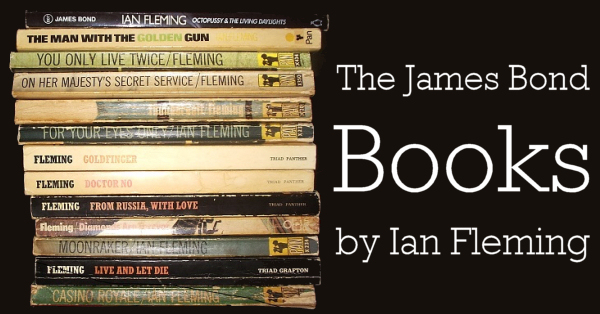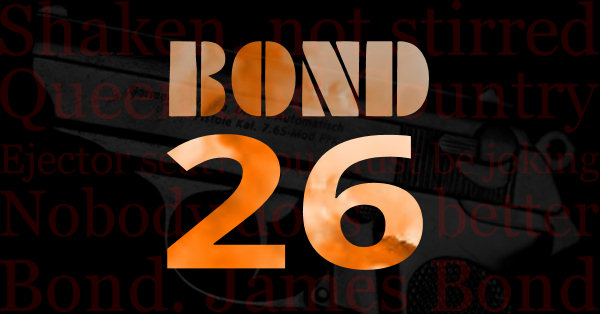Robert J Binney weighs in on the controversy over updating Ian Fleming’s texts.

At least they’re being talked about.
Ian Fleming and Roald Dahl have both been in the headlines over cries of their material being “censored”; I don’t need to repeat the news. Despite the similarities of the stories, the issues – and the results – are not the same. This may seem hypocritical, but I believe people were right to cry foul at Dahl – and that the Fleming folks are right on.
First off, in both cases it’s a far cry from “censorship”. No legal entity forced these changes, and the only jackbooted thugs are in the imaginations, limited they may be, of the pearl-clutching pundits.
The edits to both authors’ work were undertaken by their rightsholders. I like to take things at face value, and though I’m not a lawyer, it seems to me that these are the people that actually hold the rights to the work. That is, they can do what they want with it. And the public backlash – including from the queen consort – prompted Dahl’s team to withdraw the changes.
Ian Fleming Publications has indicated no sense of backing down.
Regardless of who you agree with in this many-sided debate, the issues are different. At its core, the Dahl uproar is about censoring, er, redacting ideas, whereas the James Bond debate is about editing words. The concepts that Dahl wrote about are apparently so potentially upsetting to hypothetical victims that do not have the ability to express their own agency, that the very thoughts have to be excised.
Destruction such as this eliminates the very subversiveness of the work, but also, ironically, the very idea of consequences that he writes about. As well-intentioned as these editors may have been, removing mean-spiritedness helps no one. There is no fundamental right not to be offended – sticks and stones and all that. It’s unfortunate that someone might get their feelings hurt, but that’s an unfortunate part of life.
This is the kind of silly thought-policing that ignites overblown reactionaries who then – rightfully, in this case – can toss bombs at how asinine identity politics has become. Such bubble-wrapped sensitivity makes a mockery of real, difficult discussions we should be having.
Which brings us to Bond. Making any change to a published is a slippery slope, but the footing here is surer.
For all Ian Fleming’s character flaws – a famously misogynistic drunk with an inferiority complex – he was probably no more or no less “racist” than any other British effete of the 1950’s; that is to say, he was ignorant and bigoted, but not necessarily hateful. And the edits proposed by Fleming Publications don’t change the tone or the meaning of his work. From what I’ve seen, the vast majority of the changes simply omit “the N-Word”. That’s it. And that’s why I’m okay with this.
Fleming wasn’t using that language as a means to hurt or oppress, but that is what those words mean now. Then, it was an unfortunate label that was marginally acceptable; now, the only use of such vocabulary is to be harmful. That wasn’t his intent. By keeping the writing as is, it overlays a worldview that is inconsistent with the novels themselves.
Lots of books update archaic language in subsequent editions – even the King James Bible was a rewrite for modern audiences.
Literary Bond is still a brute and a bully, an anti-Asian colonizer who repeatedly expresses the idea that women like to be forced; in other words, no one is sanitizing the stories or the characters. They’ve changed a word.
Could the publisher have simply printed a modern-day disclaimer at the start, like the revised title card preceding Gone with the Wind? It comes back down to “ideas” versus “language”; any right-minded person finds the language in Live and Let Die jarring. The words themselves become a distraction, become the story. That’s not right.
This seems to be the right call, and people protesting it are either disingenuous, or get a secret (or not-so-secret) thrill at using hateful language.
It’s not an easy decision, and there never will be clear guidelines on the right way and the wrong way to balance art and the past. There’s a continuum between doing nothing and erasing the sins of the past. The Dahl folks seem to have moved much farther toward the dangerous end of that continuum.
Nevertheless, the market did what markets are supposed to do; they’re backtracking. That’s the exact opposite of censorship.
Roald Dahl and Ian Fleming will always be linked – friends and rivals from their time together in the war until long after Fleming died, and Dahl adapted several of his works for the screen. Fleming, who constantly tinkered with his work even after publishing, probably wouldn’t care about these edits; he’d much rather pour a stiff drink, sit down, and listen to Dahl rant. I can only imagine how gleefully offensive that would be.
Robert J Binney is a writer in Seattle. He has been a James Bond fan since watching Thunderball with his dad on the ABC Sunday Night movie in 1974. You can find him on twitter at @RJBThinks.











March 2nd, 2023 at 01:57
I’m pleased that you point out that Fleming himself often revised the texts for later editions, after the first editions … although this doesn’t directly relate to the current issue, even though he apparently approved the US edits to LALD. Sadly, in my mind, his approved edits are mostly ignored in later editions, which represented his final thoughts. Most editions slavishly follow the first edition texts.
March 3rd, 2023 at 16:59
You’re talking absolute bollocks Brad Fink, censorship should be resisted at any level. Wake up, it’s 1984 you imbecile…
March 6th, 2023 at 13:09
If you’re going to leave a comment on this website, Jack, at least be polite. If you can’t do that then stay away.
March 7th, 2023 at 15:47
As a writer and journalist, I have had my works edited — not censored, mind you. Only a government entity can censor. Sometimes my editors’ edits made my works better, more concise and to the point. Other times the edits completely changed the story, and not always for the better. Oh well, that is the life of a writer unless s/he self-publishes. Mr. Binney, I think, was bang on target. Cmdr. Fleming himself sanctioned edits to some of his works. A word here or a word there has not changed his brilliant narratives. What does irk, though, is editing for the sake of being politically correct, as the publishers of my church hymnal have done. One hates to see those beautiful old songs get the PC brush. And as for the dreaded “N” word, we adopted a young black guy whose discourse is peppered with the word multiple times a day. Should he be pardoned since he is black? Or is that in itself racist?
March 7th, 2023 at 19:09
This attempt at rearranging Mr. Fleming’s classic texts brings to mind the same thing the Power Structure wanted to do to “Huckleberry Finn” some years back. But what’s the bigger picture here? Welcome to attempts at “social engineering”, plain & simple which one can look at as a bigger long range attempt at controlling information of any type, which then leads to trying to control people. Think about it even further with books like “Mein Kamph” which whenever the media mood strikes, they’ll do a story about with various book sellers saying that they’ve pulled this particular text. Yet, a few days, weeks, months, or even years it can be easily found for purchase. The ultimate issue here is about attempted control via distraction & then using such control as a way to create, maintain, & hold on to power with reinforcement, which if you look around worldwide currently & thankfully, is fading faster by the day. The People Know~!
March 7th, 2023 at 20:21
At last, some common sense.
As stated, the ideas are not being censored. It’s just a hateful, awful word that is being changed and rightly so.
Fleming himself was not racist, but a product of the times – in hindsight we can judge, but we must also understand that what we find so abhorrent today was “the norm”. However, the Fleming estate have made, in my opinion, the correct decision. I’m sure Fleming himself would approve it g he was still with us.
March 7th, 2023 at 22:28
I agree that Live and Let Die is jarring because of all the N-words. I was put off listening to it on audiobook a few years ago for that reason. I recently picked up an e-book collection and finished Live and Let Die a few weeks ago. Still jarring. If changing a word here or there makes Flemming’s works accessible to more fans, why should we question the decision of the private copyright holder?
March 8th, 2023 at 02:10
To censor is to control & orchestrate by powers other than our free selves. Remember the film “The People vs. Larry Flynt”? Mr. Flynt advocated in not so many words that if his magazine disturbed anyone, then the simple solution would be to simply not read it. The same can be said of not just the Bond books but of anything. I can’t imagine “Live and Let Die” without the vernacular that it has. The same with “Huckleberry Finn” which many African Americans as well as other people of color supported not to be changed when that particular book was taken to task. And worse yet it begs the question what will the “Powers That Be” want to take away next~? Your opinions of other things because it doesn’t fit their dysfunctional narrative~? If we let them censor then that is submitting to giving one’s personal power away & embracing subservience which is a form of mental slavery. No thanks~! I’ll keep my freedoms~!
March 8th, 2023 at 03:28
Let me quote Edward Bernays the “Father of Modern Advertising”, whose information/techniques Nazi Propaganda Minister Joseph Goebbels put to use:
“…The conscious and intelligent manipulation of the organized habits and opinions of the masses is an important element in democratic society. Those who manipulate this unseen mechanism of society constitute an invisible government which is the true ruling power of our country…We are governed, our minds are molded, our tastes formed, our ideas suggested, largely by men we have never heard of. This is a logical result of the way in which our democratic society is organized. Vast numbers of human beings must cooperate in this manner if they are to live together as a smoothly functioning society…In almost every act of our daily lives, whether in the sphere of politics or business, in our social conduct or our ethical thinking, we are dominated by the relatively small number of persons… who understand the mental processes and social patterns of the masses. It is they who control the public mind…”
This is why I stress emphatically how we must all be VERY, VERY, VERY CAREFUL as to NOT give our personal power away individually & as a society at large for the sake of trends and/or political correctness to any Power Structure whatsoever.
March 12th, 2023 at 01:11
First off, the article writer’s condescending, superior artitude to those who don’t agree with him is offputting. The blog needs to raise it’s game in that respect.
But onward. The re-writes to Fleming’s work do constitute censorship and everything that awful word implies. We can fuss over the definition of the word, but that’s not the point. These re-writes were not approved by the author. Changing even a comma is a misrepresentation of his work. And unless Ian has been communicating from the grave, no one can know that he would be OK with the changes, so please toss that faulty assertion in the rubbish.
In it’s pursuit of the almighty dollar, IFP is doing a disservice to the author and new Fleming readers looking to discover the writer’s actual original works.
The re-writes are a crass mass marketing gambit, and a stupid one at that. Once readers catch on to the censorship, and it emphatically is censorship, they will in all likely
hood, gravitate to the untarnished original versions, provocative language and all.
Fleming was provovative and risque even for his time. There is no reason to think 2020’s Fleming readers are any more sensitive than their ’50s or ’60s predecessors.
If perchance Fleming’s books don’t stand the test of time going forward, so be it, but that is a big if – they’ve held up quite well for several decades. But that’s not the point. Hacking away at the original texts, and we are talking the entire collection,in a brazen chase of sales and profit, is a soulless exercise lacking in integrity and respect for the author’s original work.
March 12th, 2023 at 14:08
“First off, the article writer’s condescending, superior artitude to those who don’t agree with him is offputting. The blog needs to raise it’s game in that respect.”
You could have made your point without the petty insults.
March 22nd, 2023 at 00:27
The retroactive editing of Fleming’s books is self-censorship on the part of the publisher. That isn’t more acceptable than government-imposed censorship. It’s similar to how Hollywood films used to get cut up under the Production Code.
The James Bond debate isn’t simply “about editing words.” It involves the outright redaction and elimination of them, not just in LALD but also TB, GF, and the other books. In fact, CR is the only Bond book that we know for sure will be untouched. And why should we be okay with ANY author being posthumously edited? There are racist words in plenty of classic books, but bookstores don’t peddle redacted copies of Hemingway or Chandler. As for the American edition of LALD, Fleming never intended for it to supersede the original outside America. He had the opportunity to re-edit the British text, but all he did was insert a factual correction (his letters, as quoted in Pearson’s biography, suggest he preferred the original version).
And yes, ideas are being redacted too. Fleming’s notorious chapter title in LALD was a reference to a once-famous novel by Carl Van Vechten that presented a sympathetic portrait of African American life in Harlem. Leiter quotes the book title to Bond when he points out an African American couple at a nearby table. After listening to their conversation Bond remarks that despite their exoticism he recognizes what he and they have in common. That nuance and context is lost in the American edition. That’s why annotations and contextual material would have been far more useful than censorship.
March 22nd, 2023 at 00:39
Continuing from my previous comment, if Fleming’s racism was casual rather than hateful, why not add a note about this to the books, instead of deleting material? Why patronizingly assume that readers can’t grasp that 60-year-old novels might have outdated attitudes? That said, Fleming’s racism wasn’t just casual. The language about Koreans in Goldfinger is outright hateful. Eliminating that, which IFP will do, is indeed santitization. It presents a false picture of Fleming’s racial attitudes. And if the goal is remove language that is a “distraction” to modern readers, why leave in all those cringey sentences about sexism and rape? Aren’t they just as distracting?
Saying that people who protest IFP’s actions “are either disingenuous, or get a secret (or not-so-secret) thrill at using hateful language” is tantamount to saying anyone who doesn’t hold your position is dishonest or a racist. Resorting to bullying rhetoric is the sign of a weak argument. Some of the people protesting IFP’s actions hold the principle that an author’s works should be printed as the author intended, not retroactively edited. They also feel that instead of having publishers lie to readers about Fleming’s racism, it should be confronted upfront, and perhaps even examined through contextual material. And they feel it’s patronizing to softsoap new readers by pretending Fleming wasn’t racist. The internet means they’ll find out soon enough. And then what will be the point of these 70th anniversary editions?